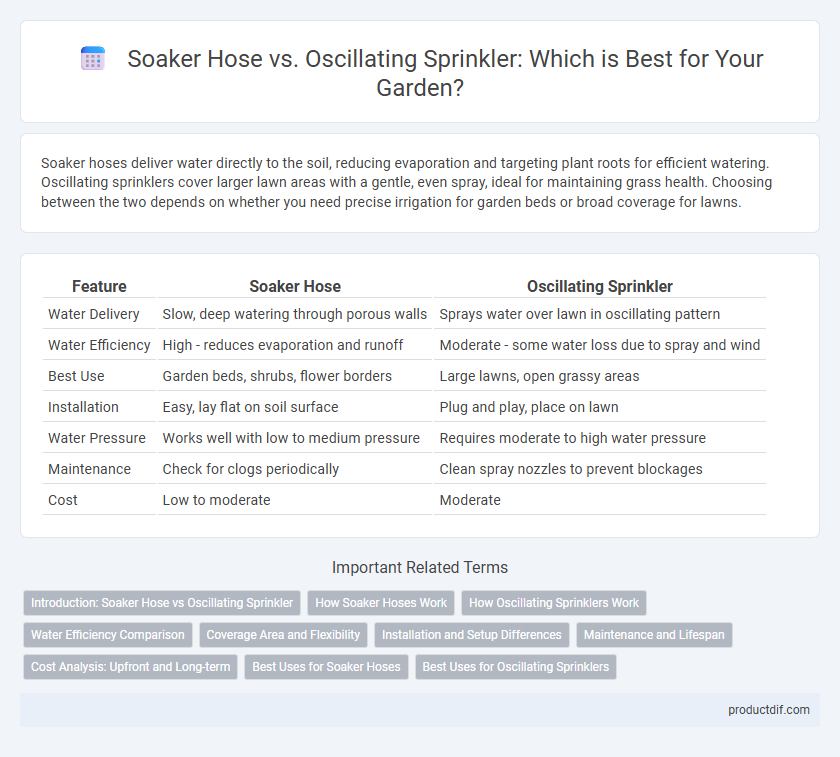Soaker hoses deliver water directly to the soil, reducing evaporation and targeting plant roots for efficient watering. Oscillating sprinklers cover larger lawn areas with a gentle, even spray, ideal for maintaining grass health. Choosing between the two depends on whether you need precise irrigation for garden beds or broad coverage for lawns.
Table of Comparison
| Feature | Soaker Hose | Oscillating Sprinkler |
|---|---|---|
| Water Delivery | Slow, deep watering through porous walls | Sprays water over lawn in oscillating pattern |
| Water Efficiency | High - reduces evaporation and runoff | Moderate - some water loss due to spray and wind |
| Best Use | Garden beds, shrubs, flower borders | Large lawns, open grassy areas |
| Installation | Easy, lay flat on soil surface | Plug and play, place on lawn |
| Water Pressure | Works well with low to medium pressure | Requires moderate to high water pressure |
| Maintenance | Check for clogs periodically | Clean spray nozzles to prevent blockages |
| Cost | Low to moderate | Moderate |
Introduction: Soaker Hose vs Oscillating Sprinkler
Soaker hoses provide slow, deep watering by releasing water directly into the soil, making them ideal for garden beds and reducing water waste. Oscillating sprinklers distribute water over a wide area with gentle, even coverage, suitable for lawns and larger garden spaces. Choosing between these watering methods depends on the specific needs of your plants and garden layout for efficient irrigation.
How Soaker Hoses Work
Soaker hoses deliver water directly to the soil through tiny pores along the hose, allowing for slow, deep irrigation that reduces water waste and promotes healthy root growth. Unlike oscillating sprinklers that spray water over the surface, soaker hoses seep water evenly, minimizing evaporation and runoff. This targeted watering method is ideal for garden beds, vegetable patches, and shrubs requiring consistent moisture levels.
How Oscillating Sprinklers Work
Oscillating sprinklers work by distributing water evenly through a long bar with multiple nozzles that move back and forth, creating a rectangular watering pattern ideal for lawns and large garden areas. They operate using water pressure to power the oscillating arm, ensuring consistent coverage and efficient irrigation without oversaturation. This mechanism contrasts with soaker hoses, which release water slowly through tiny pores for targeted, deep watering of garden beds.
Water Efficiency Comparison
Soaker hoses deliver water directly to plant roots through porous tubing, minimizing evaporation and runoff, resulting in higher water efficiency for garden irrigation. Oscillating sprinklers spray water over a broad area, leading to increased water loss from evaporation and wind drift, making them less efficient in water use compared to soaker hoses. For targeted watering and conserving water in drought-prone gardens, soaker hoses are the preferred choice over oscillating sprinklers.
Coverage Area and Flexibility
Soaker hoses provide targeted watering ideal for garden beds and rows, delivering deep soil penetration with low water pressure, covering narrow or irregular areas efficiently. Oscillating sprinklers cover broader lawn spaces with adjustable spray widths and oscillation ranges, making them flexible for various yard sizes but less precise for root-level irrigation. Choosing between the two depends on whether the priority is localized watering depth (soaker hose) or wide-area coverage with adjustable reach (oscillating sprinkler).
Installation and Setup Differences
Soaker hoses require minimal setup by simply laying the perforated hose along garden beds and connecting to a water source, allowing water to seep directly into the soil for targeted irrigation. Oscillating sprinklers need a flat, stable surface and often require assembly of the base and connecting to a hose, providing overhead irrigation with adjustable spray patterns covering larger lawn areas. The installation of soaker hoses is more flexible for irregular garden shapes, while oscillating sprinklers are ideal for uniform coverage but demand more space and precise positioning.
Maintenance and Lifespan
Soaker hoses require minimal maintenance, primarily involving occasional flushing to prevent clogging, and typically last 5 to 7 years depending on usage and care. Oscillating sprinklers need regular cleaning of nozzles and moving parts to avoid wear and rust, with an average lifespan of 3 to 5 years under normal conditions. Proper storage and seasonal protection significantly extend the durability of both garden watering tools.
Cost Analysis: Upfront and Long-term
Soaker hoses typically have a lower upfront cost, averaging $20 to $40 for a 50-foot length, making them budget-friendly for small to medium gardens. Oscillating sprinklers usually cost between $30 and $70, with higher-end models offering more features but at a greater initial investment. Over time, soaker hoses tend to save money through reduced water usage and minimal maintenance, while oscillating sprinklers may incur additional expenses for repairs or electricity if powered.
Best Uses for Soaker Hoses
Soaker hoses excel in delivering slow, deep watering directly to plant roots, making them ideal for garden beds, vegetable patches, and flower borders where water conservation and root health are priorities. Their even moisture distribution reduces surface runoff and evaporation, promoting healthier plants in raised beds and drip irrigation systems. Best used in areas requiring consistent, low-pressure hydration, soaker hoses optimize water efficiency compared to oscillating sprinklers.
Best Uses for Oscillating Sprinklers
Oscillating sprinklers deliver even water coverage over medium to large lawns, making them ideal for well-maintained grass and flower beds requiring gentle irrigation. Their adjustable spray width and range provide precise control, reducing water waste and preventing runoff. Best suited for rectangular areas, oscillating sprinklers efficiently reach multiple zones with consistent pressure, promoting healthy plant growth.
Soaker Hose vs Oscillating Sprinkler Infographic

 productdif.com
productdif.com